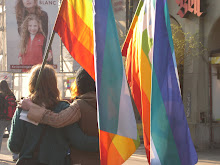
Just last week, Mr. Berlusconi stated that Italy did enjoy the highest level of freedom of press in the world. Of course he ignored the fact that in the Spring, Freedom House had placed Italy 71st, the first EU country with a partially free press ! And of course Press freedom for him means : all Press reports to him. Since he is the leader of the Freedom Party, the Press is free. Logical, isn’t it ?
He, and his colleagues, will also ignore the fact that Reporters without border just ranked Italy 49th out of 173 countries in its 2009 Press Freedom index ( http://www.rsf.org/en-classement1003-2009.html ) . After Ghana (27th), Mali (30th), Namibia (35th), Guyana (39th), Surinam (42nd) and Cape Verde (44th) among others !.
It is worth quoting here their assessment of the situation :
“Journalists investigating mafia and gangland activities, particularly in the south, do it at risk of their lives. Around a score of them, including Roberto Saviano, Lirio Abbate, Rosanna Capacchione and others still live under police protection. One phenomenon affecting the world of sport is the rise of threats against journalists specialising in football from groups of violent supporters often expressed by chanting and banners inside the football stadiums.
The Italian press can fall victim to a range of reprisals involving torching of cars and doors of their homes, threatening letters and intimidation of their families, all in the guise of “advice” given to those who persist in exposing what has gone wrong in Italian society. The grip of mafia groups on the media has become so threatening that in 2009 these groups were added to Reporters Without Borders’ list of press freedom predators.
In an anomalous situation within the European Union, prime minister, Silvio Berlusconi still controls the three channels of public RAI television as well as the leading privately owned radio and television group Mediaset, increasing political interference in their editorial lines and fostering self-censorship on the part of a section of the profession. Television which remains the main source of news for 80% of the population also attracts the lion’s share of national advertising revenue. The law promulgated by the Italian communications minister Maurizio Gasparri removed all limits on the distribution of advertising revenue, opening the door to an often massive “reorientation” in favour national television channels, particularly those belonging to the Berlusconi family.
Other recurrent problems remain, such as recruitment to the profession which is still extremely rule-bound. Those wishing to enter journalism have to pass a competitive exam and must become members of a professional body. Defamation remains a crime and the right of access to public or private information is not in practice respected.
The draft law on the publication of legal steps, which is currently under debate, contains serious threats for investigative journalism, proposing among other things a ban on publishing phone-tapping ordered by a prosecutor, until the completion of an investigation. The publication ban also applies to the work of investigative commissions. Once the draft law was adopted, journalists would from then on be unable to inform the public about any arrests, seizures or searches ordered by judges. Publication of steps, conversations or communications - the destruction of which had been ordered by a prosecutor - would still remain banned. A journalist or media violating this secrecy would face a prison sentence or very heavy fines and a three-month ban on exercising their profession.” (©Reporter swithout borders, 2009).
This is not just a ranking, it is the confirmation that Italy is sinking in a sort of dictatorship world politicians decided to ignore.
Image: © Reporters without Borders 2009




No comments:
Post a Comment